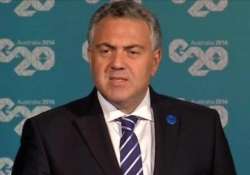G-20 pushes US to ratify IMF reforms by year end
Washington: Expressing disappointment at the continued delay over International Monetary Fund's quota and governance reforms that would give emerging economies, including India, a greater voice, the G-20 has given the US a year end deadline

Washington: Expressing disappointment at the continued delay over International Monetary Fund's quota and governance reforms that would give emerging economies, including India, a greater voice, the G-20 has given the US a year end deadline to ratify them.
“If the 2010 reforms are not ratified by year-end, we will call on the IMF to build on its existing work and develop options for next steps,” the finance ministers and central bank governors from the world's leading economies said Friday in a committee.
The group will then work with the Fund's International Finance and Monetary Committee “to schedule a discussion of these options,” they said in a communique after a meeting on the sidelines of the IMF-World Bank spring meetings here.
The finance chiefs said they were “deeply disappointed with the continued delay in progressing the IMF quota and governance reforms agreed to in 2010 and the 15th General Review of Quotas (GRQ) including a new quota formula.”
The reforms would double the IMF's resources and increase the voting power of emerging economies like the BRICS - Brazil, Russia, India, China and South Africa.
Reaffirming the importance of the IMF as a quota based institution, G-20 finance officials said “the implementation of the 2010 reforms remains our highest priority and we urge the US to ratify these reforms at the earliest opportunity.”
“We are committed to maintaining a strong and adequately resourced IMF,” they said.
Welcoming “the prospects for global economic growth to strengthen in 2014” the group said they “remain vigilant in the face of important global risks and vulnerabilities.”
“We are determined to manage these risks and take actions to further strengthen the recovery, create jobs and improve medium-term growth prospects.”
“Structural reforms are especially important to achieve our common objective,” the group said noting it “focused at this meeting on the importance of reforms which foster greater competition in product and service markets.”
“These reforms, along with measures to enhance trade, can foster efficiency and dynamism and lift productivity in our economies, especially when combined with strong competition frameworks and enforcement,” the communiqué said.
The officials also “reaffirmed the critical importance that investment plays in lifting economic growth and employment, including in low income countries.”
As part of the package of measures for the Brisbane Summit, the group said they “will commit to country specific and collective actions to be included in our growth strategies.
These will include a set of leading practices to promote and prioritise quality investment, particularly in infrastructure.
G-20 said it was “strengthening our macroeconomic cooperation by further deepening our understanding of each other's policy frameworks and assessing the collective implications of our national policies across a range of possible outcomes.”
“If the 2010 reforms are not ratified by year-end, we will call on the IMF to build on its existing work and develop options for next steps,” the finance ministers and central bank governors from the world's leading economies said Friday in a committee.
The group will then work with the Fund's International Finance and Monetary Committee “to schedule a discussion of these options,” they said in a communique after a meeting on the sidelines of the IMF-World Bank spring meetings here.
The finance chiefs said they were “deeply disappointed with the continued delay in progressing the IMF quota and governance reforms agreed to in 2010 and the 15th General Review of Quotas (GRQ) including a new quota formula.”
The reforms would double the IMF's resources and increase the voting power of emerging economies like the BRICS - Brazil, Russia, India, China and South Africa.
Reaffirming the importance of the IMF as a quota based institution, G-20 finance officials said “the implementation of the 2010 reforms remains our highest priority and we urge the US to ratify these reforms at the earliest opportunity.”
“We are committed to maintaining a strong and adequately resourced IMF,” they said.
Welcoming “the prospects for global economic growth to strengthen in 2014” the group said they “remain vigilant in the face of important global risks and vulnerabilities.”
“We are determined to manage these risks and take actions to further strengthen the recovery, create jobs and improve medium-term growth prospects.”
“Structural reforms are especially important to achieve our common objective,” the group said noting it “focused at this meeting on the importance of reforms which foster greater competition in product and service markets.”
“These reforms, along with measures to enhance trade, can foster efficiency and dynamism and lift productivity in our economies, especially when combined with strong competition frameworks and enforcement,” the communiqué said.
The officials also “reaffirmed the critical importance that investment plays in lifting economic growth and employment, including in low income countries.”
As part of the package of measures for the Brisbane Summit, the group said they “will commit to country specific and collective actions to be included in our growth strategies.
These will include a set of leading practices to promote and prioritise quality investment, particularly in infrastructure.
G-20 said it was “strengthening our macroeconomic cooperation by further deepening our understanding of each other's policy frameworks and assessing the collective implications of our national policies across a range of possible outcomes.”